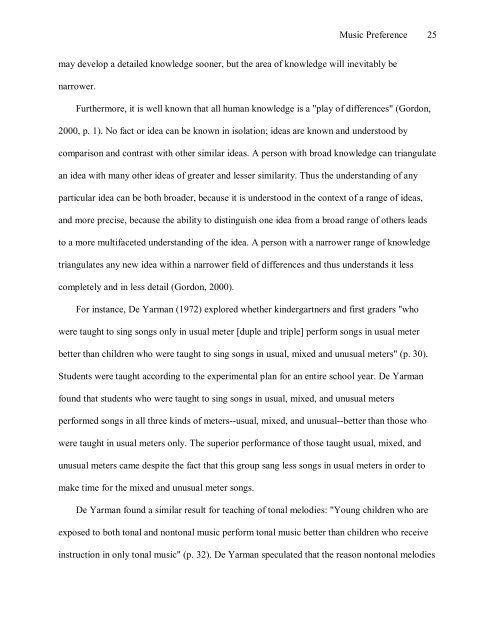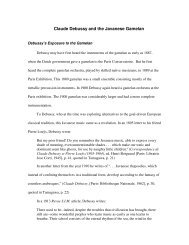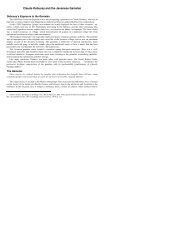Music Preference 1 - Brent Hugh's personal and business web pages
Music Preference 1 - Brent Hugh's personal and business web pages
Music Preference 1 - Brent Hugh's personal and business web pages
You also want an ePaper? Increase the reach of your titles
YUMPU automatically turns print PDFs into web optimized ePapers that Google loves.
<strong>Music</strong> <strong>Preference</strong> 25<br />
may develop a detailed knowledge sooner, but the area of knowledge will inevitably be<br />
narrower.<br />
Furthermore, it is well known that all human knowledge is a "play of differences" (Gordon,<br />
2000, p. 1). No fact or idea can be known in isolation; ideas are known <strong>and</strong> understood by<br />
comparison <strong>and</strong> contrast with other similar ideas. A person with broad knowledge can triangulate<br />
an idea with many other ideas of greater <strong>and</strong> lesser similarity. Thus the underst<strong>and</strong>ing of any<br />
particular idea can be both broader, because it is understood in the context of a range of ideas,<br />
<strong>and</strong> more precise, because the ability to distinguish one idea from a broad range of others leads<br />
to a more multifaceted underst<strong>and</strong>ing of the idea. A person with a narrower range of knowledge<br />
triangulates any new idea within a narrower field of differences <strong>and</strong> thus underst<strong>and</strong>s it less<br />
completely <strong>and</strong> in less detail (Gordon, 2000).<br />
For instance, De Yarman (1972) explored whether kindergartners <strong>and</strong> first graders "who<br />
were taught to sing songs only in usual meter [duple <strong>and</strong> triple] perform songs in usual meter<br />
better than children who were taught to sing songs in usual, mixed <strong>and</strong> unusual meters" (p. 30).<br />
Students were taught according to the experimental plan for an entire school year. De Yarman<br />
found that students who were taught to sing songs in usual, mixed, <strong>and</strong> unusual meters<br />
performed songs in all three kinds of meters--usual, mixed, <strong>and</strong> unusual--better than those who<br />
were taught in usual meters only. The superior performance of those taught usual, mixed, <strong>and</strong><br />
unusual meters came despite the fact that this group sang less songs in usual meters in order to<br />
make time for the mixed <strong>and</strong> unusual meter songs.<br />
De Yarman found a similar result for teaching of tonal melodies: "Young children who are<br />
exposed to both tonal <strong>and</strong> nontonal music perform tonal music better than children who receive<br />
instruction in only tonal music" (p. 32). De Yarman speculated that the reason nontonal melodies





